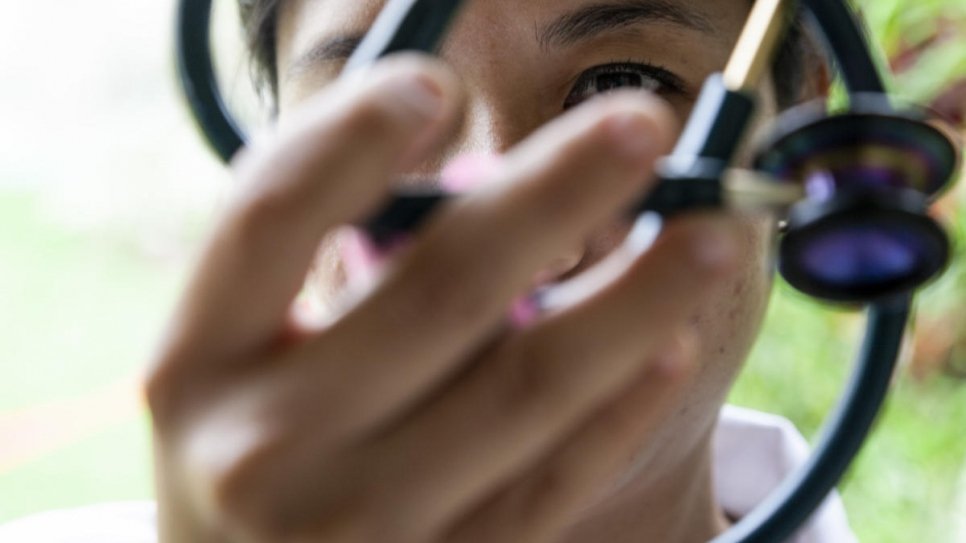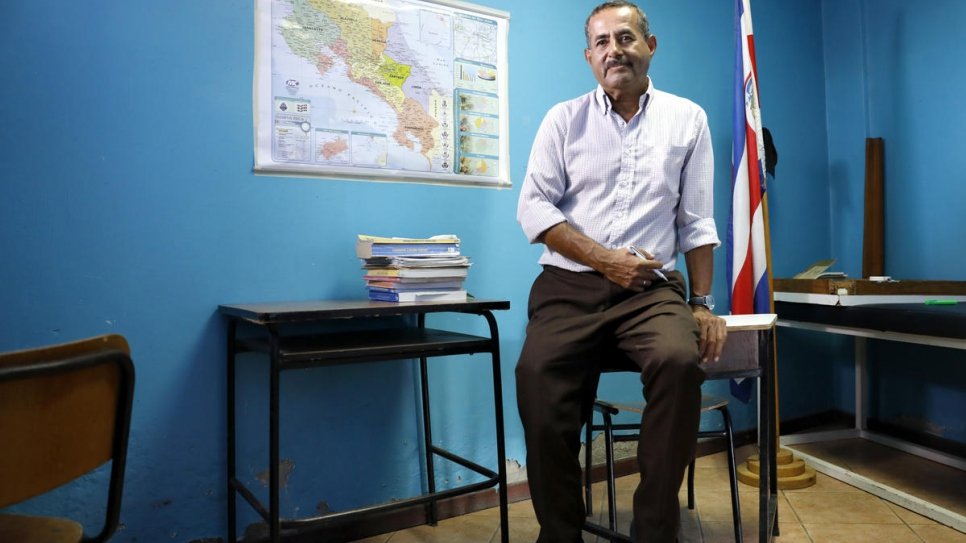Nicaraguan professionals seek safety in Costa Rica
Doctors, lawyers and professors are among professionals forced to flee their Central American homeland for doing their jobs.
Nicaragua lawyer and rights activist Braulio Abarca, 28, pictured at a church in the Costa Rican capital San Jose.
© UNHCR/Daniel Dreifuss
When anti-government protests broke out in Nicaragua in 2018, Sara,* a pediatrician, knew the Hippocratic Oath obliged her to treat anyone in need. Attorney and human rights advocate Braulio Abarca felt it was his duty to defend the rights of protesters hauled off to Managua’s notorious El Chipote prison. University professor Carlos* said his conscience obliged him to stand alongside his students during the marches.
As a result, all three of these professionals faced retaliation, intimidation and death threats. All three fled for their lives, applying for asylum in neighbouring Costa Rica – which has received over 68,000 of the estimated 82,000 Nicaraguans who have fled the country since the start of the April 2018 crackdown.
The clampdown has targeted not only protesters, but also anyone suspected of aiding or even sympathizing with them. Unable to continue the careers they worked so long and hard to build, all three have had to scramble to secure any sort of job to pay the bills.
After doctors in public hospitals were prohibited from treating anyone suspected of having been injured in the demonstrations, Sara,* a 34-year-old mother of two, pitched in with a group of other doctors, nurses, paramedics and others who banded together to treat patients in need. As a result, she was targeted for retaliation. Paramilitary groups tailed her on several occasions, she said, and once staked out the home where she lived with her young children.
“They forced us to flee the country ... Because if we didn’t, it would have been death or prison.”
“I decided to leave immediately…. I felt they were threatening my life and I couldn’t stay any longer,” she recalled. “I left the hospital where I worked, my stable life, I took my kids out of our enviable circumstances and plunged them into a situation that’s not what I would want for them.”
But she insists she had no other choice.
“They forced us to flee the country,” said Sara, who requested to hide her identity out of fears that her family and friends still in Nicaragua could be similarly targeted. “Because if we didn’t, it would have been death or prison.”
Braulio, a 28-year-old attorney who worked for an organization called the Nicaraguan Center for Human Rights, said he faced targeted threats in retaliation for having represented protesters detained at El Chipote prison, where activists say prisoners are regularly subjected to torture and sexual violence.
“As human rights advocates, we were the voice of those who don’t have a voice, those who were silenced for not thinking the same as the government,” he said. He added that he received messages via social media saying “if I kept on speaking out against the police I was going to wake up with flies in my mouth, meaning that I could be killed for ... simply doing my job.”
With the help of a coyote, or people smuggler, Braulio slipped across Nicaragua’s porous southern border into Costa Rica under the cover of night.
“As a human rights advocate, you have to recommend to people that, in order to protect their life and liberty, they have to leave the country,” he said. “But having to do it yourself … having to … grab a backpack and put in a shirt, a pair of pants, a pair of shoes and cross the border irregularly, without being able to say goodbye to your family ... It’s something I wouldn’t wish on anyone.”
For Carlos,* the university professor who took part in protests alongside his students, the threats were even more explicit. He described being shot at on three different occasions. In a separate incident, he confronted members of an armed group who were watching the houses of those thought to harbour anti-government sentiments and told point-blank he would be killed.
The close calls got him thinking.
“My daughter lives here. My other kids come here… and my grandkids live here,” said Carlos, a 60-year-old father of three, who has nine grandchildren and one great-grandchild. He thought to himself: “If I am not to put my family in harm’s way, I have to leave.”
“These are classic UNHCR mandate cases ... these are individuals and their families who are fleeing targeted persecution."
Like Braulio, Carlos slipped across the border in the middle of the night and applied for asylum in Costa Rica.
“These are classic UNHCR mandate cases,” said César Pineda, 42, who heads the UN Refugee Agency’s field office in Upala, a small Costa Rican town near the border with Nicaragua. “Basically, these are individuals and their families who are fleeing targeted persecution …. We have people who have been the victims of violence, people who have been tortured, people who have very valid reasons to be afraid to return to Nicaragua because they, personally, have been threatened.”
For all three of these professionals forced to flee for having done their jobs or having expressed a political opinion, making ends meet in Costa Rica has proven a major challenge.
Since Costa Rican regulations require her to go through a drawn-out bureaucratic process before she is able to resume her work as a physician, Sara has scrambled to find any paying job – even applying to work at fast food restaurants and as a supermarket cashier. Eventually she found a position as a web designer. And while she is grateful for the job, she is disappointed not to be able to put the skills to good use in her host country.
Braulio, meanwhile, lived in a shelter before banding together with six of his former colleagues – who were also forced to flee after the offices of the Nicaraguan Center for Human Rights were ransacked – to form the Nicaragua Never Again Collective, a nonprofit that provides legal aid to fellow Nicaraguan asylum-seekers in Costa Rica.
Carlos lived on the streets before eventually finding a job teaching remedial high school classes with an NGO based in a San José slum. It is still not safe for he and the other professionals to return home, although it remains their greatest hope. “I dream of going back to Nicaragua,” said Carlos.
* Names have been changed for protection reasons.


